Things You Should Never Say To Someone Who Is Depressed
Taboo, glamorized, and misunderstood, depression is not fully recognized as a mental illness across the globe. Although studies inform the mass that depression stems from a biological disposition, it is mocked and minimized. Often when a friend or loved one reveals to us that they are struggling with depression, we have been taught in our society to form conclusions and solve their problems. We believe we are helping them by giving them a list of things to do. During their hardship, the most human approach is comfort and give affection. Just listen.
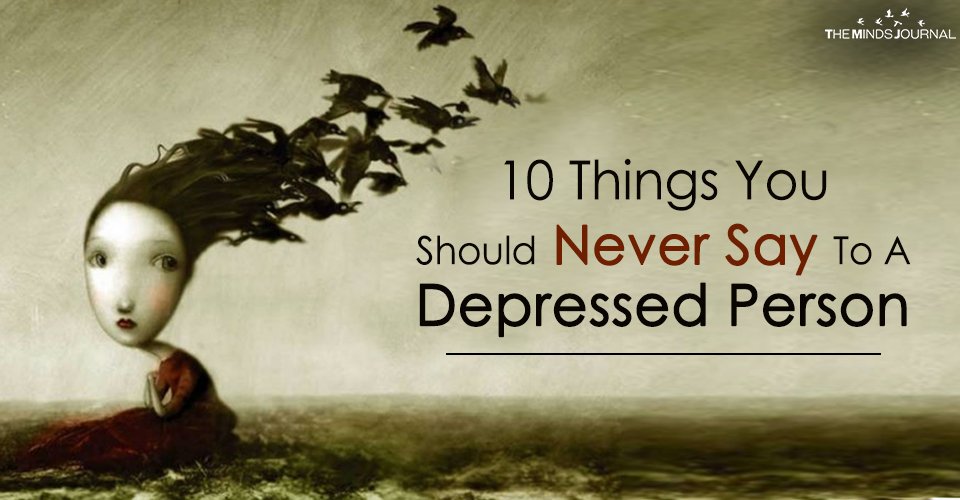
Below, we have compiled a list of things you should never say to a depressed person. Uttering these words may cost your bond, drive someone to a deeper depression and create an irreversible distrust. Before we begin, we leave you with these wise words from Stephen Fry:
“If you know someone who’s depressed, please resolve never to ask them why. Depression isn’t a straightforward response to a bad situation; depression just is, like the weather.
Try to understand the blackness, lethargy, hopelessness, and loneliness they’re going through. Be there for them when they come through the other side. It’s hard to be a friend to someone who’s depressed, but it is one of the kindest, noblest, and best things you will ever do.”
10 Things You Should Never Say To A Depressed Person
1. It’s just a phase. You’re just sad.
Telling any human being how to feel or what they are feeling is the most condescending thing you could imply. When you diminish a person’s emotions and struggles, you also humiliate and invalidate their existence. Telling a depressed person, they are “just sad” is a violation of the trust they have given you. Don’t judge, simply listen. Many suffer in silence, and when someone confides in you, take their word.
What to say: I believe you.
There is no point treating a depressed person as though she were just feeling sad, saying, There now, hang on, you’ll get over it. Sadness is more or less like a head cold- with patience, it passes. Depression is like cancer.”
— Barbara Kingsolver, The Bean Trees
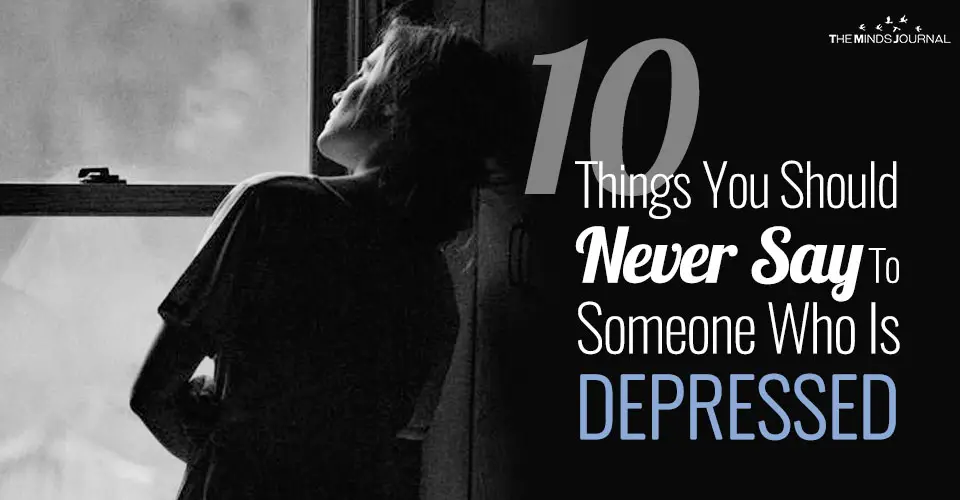
2. Other people have it worse. Life isn’t fair.
By claiming that there are people around the world who suffer in greater lengths than your loved one is an insult to their intelligence. Whether a person is depressed or not, this phrase should never leave your lips.
What to say: You matter to me. You are not alone.
3. It’s all in your head.
Again, you are minimizing this person’s struggle. You are invalidating their feelings and existence. Someone with depression already accuses themselves. When someone they confide in points a finger, they lose trust. It makes them feel far more isolated and alone in the world. This is the last thing you want to do.
What to say: I’m sorry you are hurting. I will not abandon you. Don’t worry about me.
4. You have no reason to be depressed.
Telling a person what to feel or how to feel is useless. The most important thing to do is to acknowledge someone’s pain and remind them that you are there for them. Depression is something a person can’t verbalize or intellectualize even to their most inner selves. They owe you no explanations, especially when they don’t have one.
What to say: I am here for you.
You say you’re depressed – all I see is resilience. You are allowed to feel messed up and inside out. It doesn’t mean you’re defective – it just means you’re human.
— David Mitchell, Cloud Atlas
5. Just be happy.
Telling someone to cheer up is insensitive. It gives the message that you have no wish to understand or comfort them. It sounds harsh, but this is the truth. Asking someone to cheer up makes them uncomfortable in their own skin.
What to say: We are both here for each other.
“I lost all interest in my schoolwork, friends, reading, wandering, or daydreaming. I had no idea what was happening to me, and I would wake up in the morning with a profound sense of dread that I was somehow going to have to make it through another entire day. I would sit for hour after hour in the undergraduate library, unable to muster enough energy to go to class. I would stare out the window, staring at my books, rearrange them, shuffled them around, leave them unopened, and think about dropping out of college. When I did go to class it was pointless. Pointless and painful. I understood very little of what was going on, and I felt as though only dying would release from the overwhelming sense of inadequacy and blackness that surrounded me. I felt utterly alone, and watching the animated conversations between my fellow students only made me feel more so.”
— Redfield Jamison, Kay. An Unquiet Mind: A Memoir of Moods and Madness
Read 5 Things You Can Do To Overcome Depression And Anxiety Naturally
6. Get involved. Get out of the house. Be active! Exercise!
Depression isn’t something you can snap out of. A depressed person already criticizes themselves and has pushed themselves to get better, but they can’t turn it off. Don’t demand, instead listen and accept. Be sincere. Offer your time to take a walk with them, watch a movie, or do anything else they may enjoy.
What to say: I know you are not in the mood to go out, but we should do something together!
“When you feel perpetually unmotivated, you start questioning your existence in an unhealthy way; everything becomes a pseudo-intellectual question you have no interest in responding whatsoever. This whole process becomes your very skin and it does not merely affect you; it actually defines you. So, you see yourself as a shadowy figure unworthy of developing interest, unworthy of wondering about the world – profoundly unworthy in every sense, and deeply absent in your very presence.”
—Ingmar Bergman
7. Stop it with the self-pity!
Do not tell somebody who is depressed to stop feeling sorry for themselves. This is a cruel thing to express. Depression is not something people can turn on and off. Instead, make your loved one aware that you’re available to help in any way you can.
What to say: I was here before this, and I will be here during and after this.
8. I know how you feel. I was also depressed once.
Although you mean well, you cannot tell a person how they feel. Every individual is different. We forget that when somebody shares their hurt, they are extremely vulnerable and naked. They do not expect you to fully understand or solve their problems. They simply want someone, who listens and comforts. Hold their hand.
What to say: I don’t know what you are feeling, but you can count on me. I’ll try my best to understand.
“Mental pain is less dramatic than physical pain, but it is more common and also harder to bear. The frequent attempt to conceal mental pain increases the burden: it is easier to say My tooth is aching than to say My heart is broken.”— C. S. Lewis, The Problem of Pain
Read What Not To Say (And What You Should Say) To A Person With Depression
9. What is the problem? What is wrong?
There could be many things wrong. Or there could be nothing wrong. We urge you to accept this concrete piece of advice: a depressed person has no fixed explanation for their feelings. Don’t demand answers. Just be there. Listen.
What to say: Do you want a hug?
“It’s so difficult to describe depression to someone who’s never been there because it’s not sadness. I know sadness. Sadness is to cry and to feel. But it’s that cold absence of feeling— that really hollowed-out feeling.” — J.K. Rowling
10. You are bringing me down.
This response is unacceptable. People, who usually suffer from depression, endure it in silence. Don’t violate their trust. Depression is not a choice. A depressed person feels helpless. They don’t have the means to help themselves, and they don’t need the burden of these heavy words.
What to say: I care about you.
Lastly, we remind you to be compassionate, motivating and thoughtful. Do not criticize something you don’t understand. Depression is a biological illness, which affects an individual psychologically and socially. Although research hasn’t yet proven the reasons why some people are naturally inclined to acquiring depression, we do know it needs to be studied and taken seriously.
Although this is not a complete list of things you should never say, it is a list of the most hurtful things you should not say. Please comment below and share your thoughts.
Read How To Help Your Partner (And Yourself) Overcome Depression
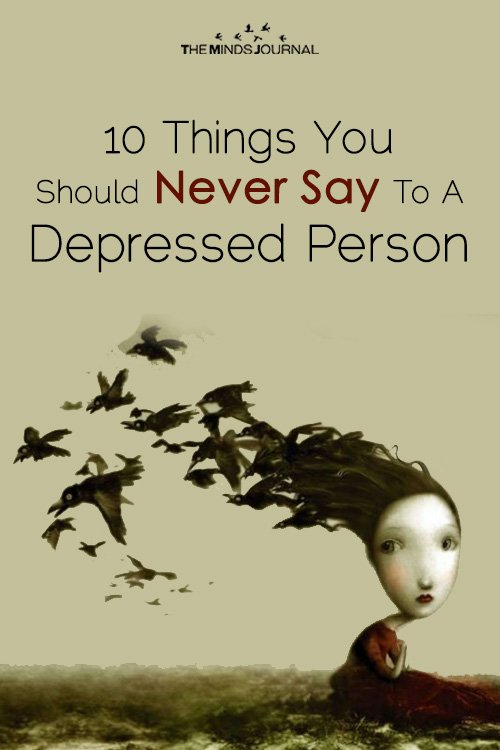
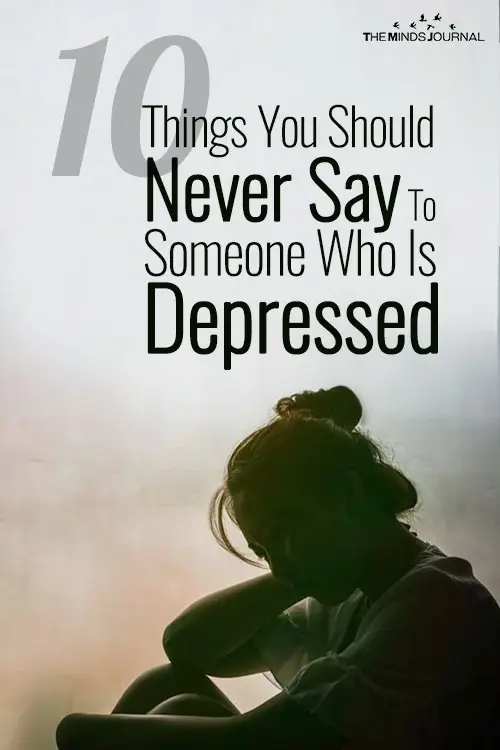
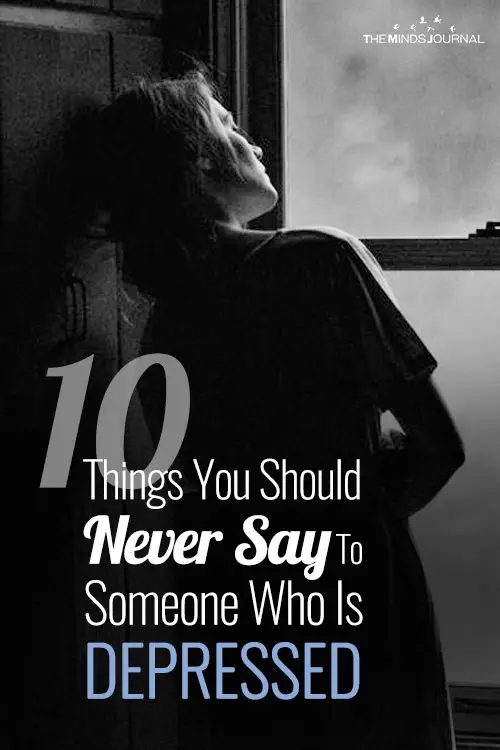
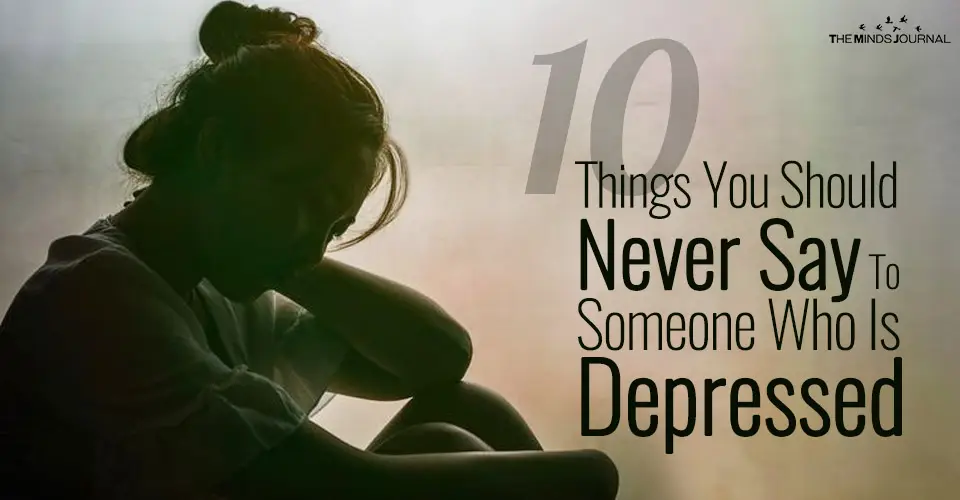

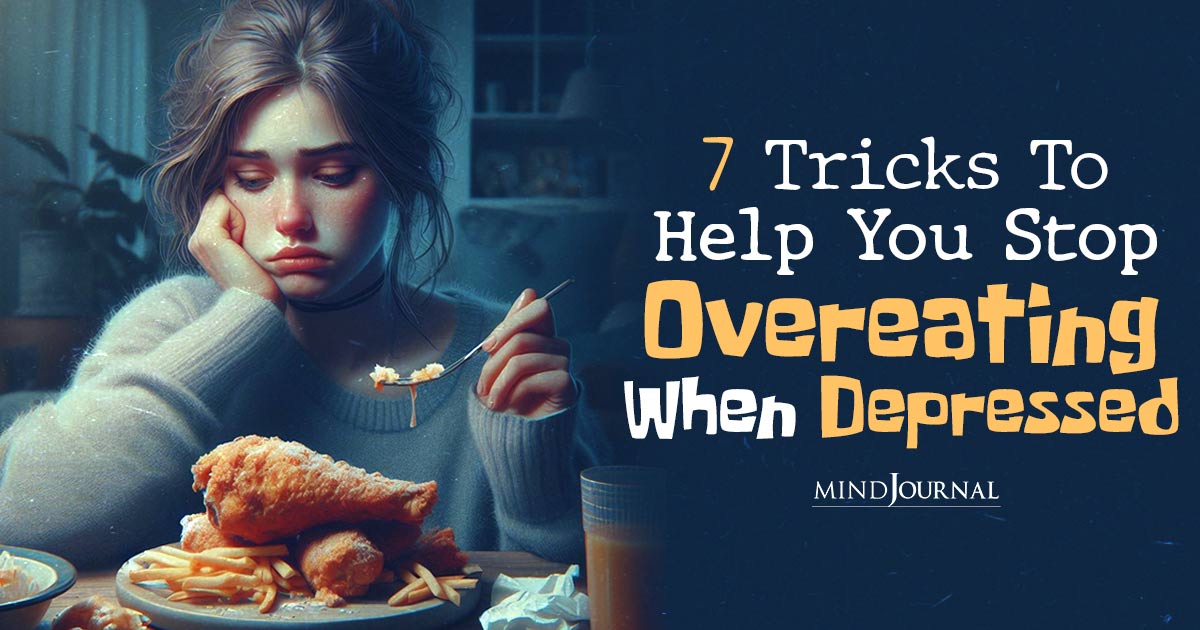
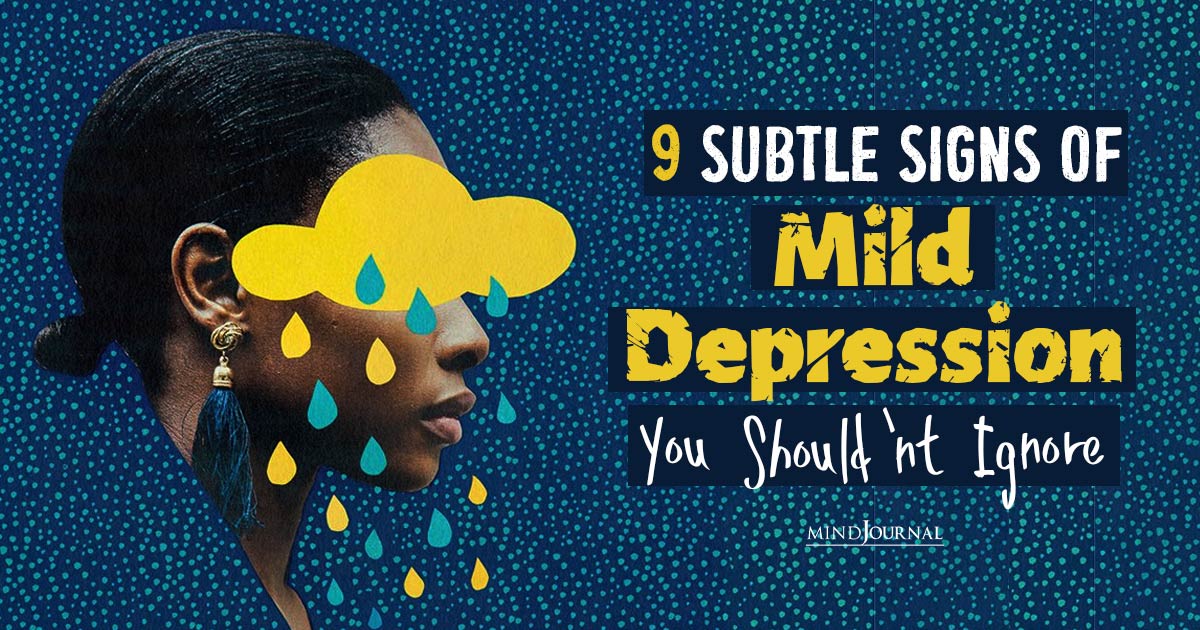
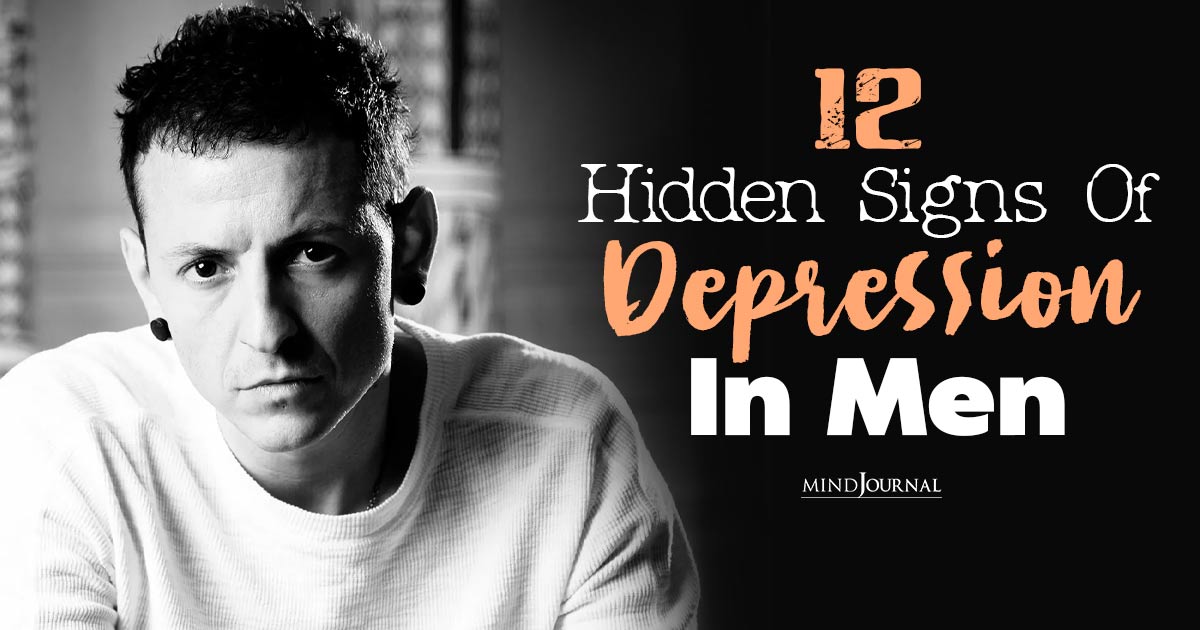
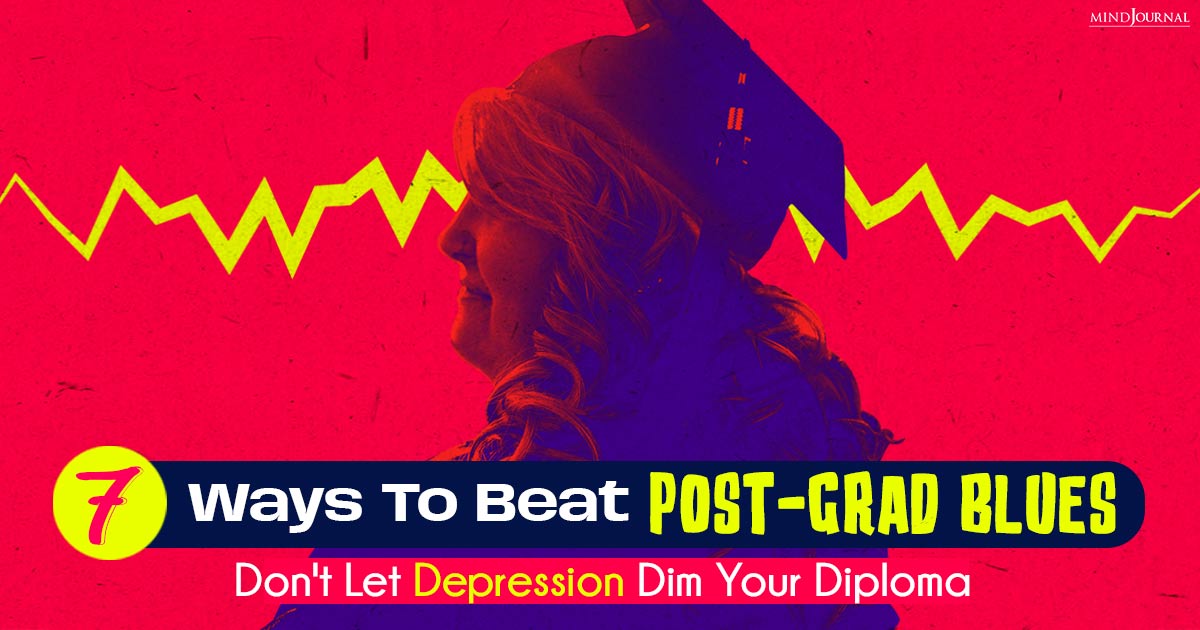
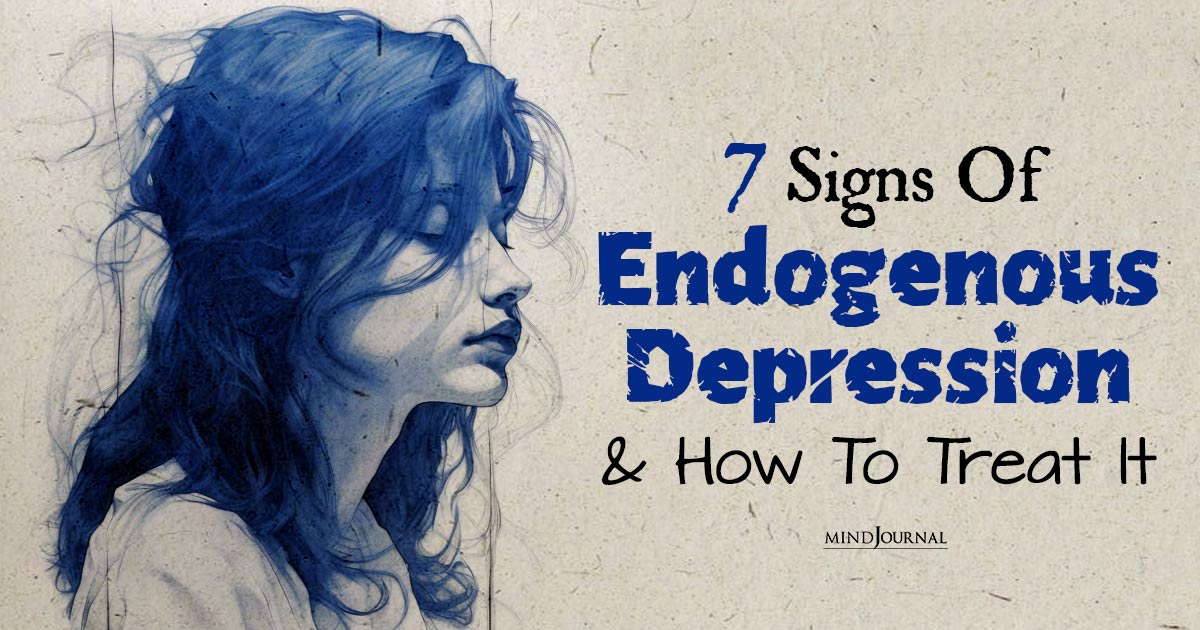

Leave a Reply
You must be logged in to post a comment.